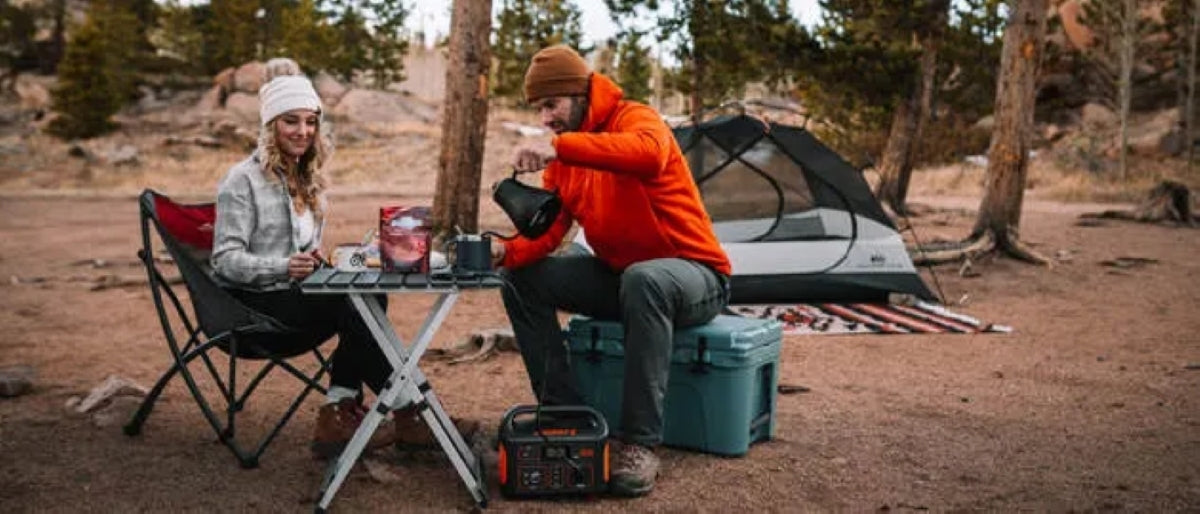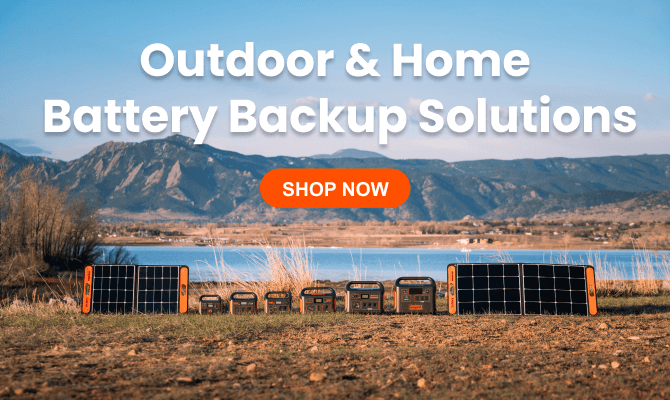Whether you're a seasoned camper or someone who is just starting out, you'll come across different terms like boondocking, dry camping, and dispersed camping. But what is boondocking, and how is it different from others? In simple terms, it is a cost-effective camping type without having access to all the amenities. In boondocking, you'll be required to bring your own power source, water, shelter, and other amenities needed.

The high-capacity Jackery Explorer Portable Power Stations are lightweight and robust in nature, making them ideal for camping trips. They are compatible with Jackery SolarSaga Solar Panels, so you can quickly recharge the battery without worrying about finding electrical outlets. Below are two popular Jackery Explorer Power Stations for boondocking trips.
What Is Boondocking?
Some RV travelers refer to boondocking as dry camping when you are not connected to any public electricity, sewer, or water source. The main aim of boondocking is to connect with nature and spend time away from the chaos of city life.
The main reason why people love boondocking is to reduce unnecessary vacation expenses. This camping type means you don't have to spend money like you do in built-up campgrounds. There are many boondocking sites available for free or much cheaper than usual camping.
What Are The Types of Boondocking?
There are many popular variations of boondocking out there: wallydocking, moochdocking, wild camping, lotdocking, and dry camping. While most of these terms are used interchangeably, they have some differences. Let's explain them briefly.
Wallydocking: It's a common boondocking or dry camping style that lets you stay overnight in an RV, generally in a Walmart parking lot, without setting up camp or hookups.
Moochdocking: Also known as driveway camping or driveway surfing, this camping type means you camp for free on someone else's private land. You can stay a night or two on private land with no expenses.
Wild Camping: It is synonymous with the term boondocking. You can start boondocking in the middle of nowhere by parking your RV — just a short distance from civilization. In this camping type, you'll rely on your own supplies for power, water, etc.
Lotdocking: When retail businesses let RVers accommodate and enjoy free night parking, it is called lotdocking. Some popular retailers include Walmart, Home Depot, Pilot, Lowe's, and more. Besides retailers, many casinos have also started offering free overnight camping.
Dry Camping: When camping without hookups in remote areas, it is generally called dry camping. Here, you have to be entirely self-sufficient for a while.
What Are The Boondocking Essentials?
When boondocking (camping without hookups) in an RV campground, you'll need to pack the essentials to make your next trip memorable.
- Shower Head: A low-flow shower head with shutoff capability helps you make the most out of your water supply and enjoy a freshwater shower every day.
- LED Lights: These lights save 80-90% of energy compared to incandescent counterparts. A few camping lights will help you illuminate the space and stay safe.
- Fan or Heater: Depending on your boondocking location and weather, you'll likely need a fan or heater to cool down or warm up your space.
- WiFi Routers: Pack a WiFi router if you want to spend time around remote nature while maintaining a connection with civilization.
- Mini-Fridge: Carry a small refrigerator to safely store your food items throughout the camping trip.
- First-Aid Kit: Boondocking means you'll need to visit remote places that are usually far from medical attention. Therefore, pack some bandages, sterilizing solutions, scissors, and tweezers.
- Jackery Solar Generators: Your mini-fridge, WiFi router, fan, and heater will require power. But how do you find energy in the middle of the woods? That's where Jackery Solar Generators serve as a great choice. They combine power stations and solar panels, so you can charge boondocking appliances.
Boondocking Basics: How To Boondock?
If you are boondocking for one night, you won't need to do too much preparation. But if you plan for a few day trips, you'll need a freshwater tank, a single power source, and some appliances. This section sheds light on boondocking basics (power, water, shelter, and more) and what you need to know before your RV hits the road.
What to Know Before Boondocking?
Before heading out into the wilderness, checking the weather forecast is essential. The ideal temperature for boondocking is 40-70°F, which lets you enjoy the outdoors without running an AC or heater. Besides checking the temperature, you need to ask yourself a few crucial questions, like:
- Is your RV or camper ready for boondocking? You'll also need an alternative power source, freshwater holding tanks, and a mini-refrigerator for your RV.
- Is the temperature agreeable where you plan to boondock? An ideal weather means you won't have to use power-hungry appliances like heaters and air conditioners.
- How long are you planning to boondock? This will help you understand how many devices you must carry before you move out.
Boondocking Basics
One essential part of a successful boondock trip is to know what to pack in your backpack. Now that we have covered what is boondock camping, here are the essentials you'll need.
Power
Since no electrical outlets are available during boondocking, you'll need to invest in one or more power sources to run appliances. Jackery Solar Generators are designed to supply power to efficiently run devices like blenders, microwaves, etc.
Water
While there is no set number of water gallons you need during boondocking, you should fill at least one or two water tanks before your trip. This will provide enough water for showers, dishes, and regular bathroom use.
Internet
There is no public WiFi in wild or dispersed camping sites. That's why you need a stable Internet connection to stay connected with your loved ones.
Safety
While boondocking, you'll need to be prepared to face animals and other dangers. Choosing the right location with necessary safety facilities is the best way to boondock. You may also get stuck in an RV due to bad weather. If there's a chance of bad weather, it's ideal to stock the rig with some extra supplies.
Clearance
You never know when the boondocking route might feature a narrow road or a short bridge. That's why height and width clearances are always a significant concern. The simple yet effective way to check ground clearance is by sending a scout vehicle (like a car) ahead of you.
What Size of Solar Generator is Needed for Boondocking?
While boondocking, you'll require only a few essential energy-efficient appliances that consume less power and can be charged using solar generators. But the exact size of a solar generator for boondocking or camping will depend on how many electrical devices you are carrying and for how long you are using them.
For instance, if you are using a fan of 70 watts for 5 hours, you need 70W*5H = 350Wh of power.
Jackery is the global leader in manufacturing portable solar generators, power stations, and solar panels.
You can connect the power station with solar panels using the solar cables. When the sunlight falls on the upper surface of the PV panels, it gets converted to electricity and is stored in the battery or power station.
The built-in inverter of Jackery Explorer Portable Power Stations converts the DC electricity to AC, so you can power most boondocking appliances. Here's a diagram that illustrates how the Jackery Solar Generator works for boondocking trips.

Let's take an example and calculate the working hours of Jackery Solar Generator 500, assuming you charge a fan (70W).
Working Time = Capacity in Wh * 0.85 / Operating wattage of the device (fan) = 518Wh * 0.85 / (70W + 25W) = 4.6H.
Note: 0.85 represents that there will be some power loss that happens when powering the appliance. Here, 25W is the power consumption needed to turn DC to AC.
Jackery Solar Generator 1000 v2
The Jackery Solar Generator v2 is a suitable companion for boondocking adventures, offering reliable off-grid power in various scenarios. Whether you're camping in the wilderness or enjoying a remote RV getaway, it ensures you can keep your essentials running smoothly. Its compact design makes it easy to transport, while the solar panel efficiently recharges it, so you’re always ready for the next adventure.
Customer Review
“This unit gives me exactly the power I need to run my desktop computer and monitor for nine hours from anywhere. Now, I can set up my workstation overlooking the picturesque mountains of Sedona. The solar charging works excellently, and it gives me a completely recharged battery in under seven hours. Thanks, Jackery!” — Jeffrey Justice.
Jackery Solar Generator 500
Jackery Solar Generator 500 is a lighter solar charging solution than Solar Generator 1000. It has a capacity of 518Wh and features multiple ports (three USB ports, a 12V car output, and an AC outlet) to provide stable electricity to the electrical devices. With 1*Jackery SolarSaga 100W Solar Panels, you can recharge the power station in only 9.5 hours.

Customer Review
"I bought the Explorer 500 power source and the SolarSaga 100W solar panel for my CPAP when we go camping. Works perfectly. Use it for a night or two and charge it in the day. Never have to worry about power for my CPAP machine. And the built-in flashlight comes in handy too." — Mark.
|
Series |
Capacity |
Noise Level |
Lifespan |
Boondocking Appliances |
|
Jackery Solar Generator 1000 v2 |
1070Wh |
Less than 30dB |
4000 cycles to 70%+ capacity |
Light (5W): 43.8H Blender (300W): 2.7H Space Heater (300W): 2.7H Mini-Fridge (350W): 2.4H Phone (18W): 26.5H Smart Speaker (10W): 35H Fan (70W): 10.3H Camera (9W): 36.5H Drone (90W): 8.3H
|
|
Solar Generator 500 |
518Wh |
37.9dB |
500 cycles to 80%+ capacity |
Light (5W): 28.3H Blender (300W): 1.3H Space Heater (300W): 1.3H Mini Fridge (350W): 1.1H Phone (18W): 15.1H Smart Speaker (10W): 21.2H Fan (70W): 5.3H Camera (9W): 22.3H Drone (90W): 4.2H
|
Note: All the calculations are based on mathematical formulas, and the actual working hour may vary.
Boondocking FAQs
How to find the best sites for boondocking?
As boondocking and RVing are becoming more popular than ever, there are many online resources available. Additionally, you can find many boondocking apps and websites like Campendium, Allstays App, US Public Lands App, and Harvest Hosts. While boondocking in national parks is not allowed, some parks, like Big Bend in Texas, take reservations for the boondock trips.
Is boondocking legal? or safe?
While camping in the middle of nowhere might feel suspect, it is encouraged by local and state governments. Many places are available where you can spend a night without paying a dollar. Regarding safety, boondocking in an RV is as safe as tent camping, if not more.
Is boondocking worth it?
Yes, boondocking gives you a space to spend time with nature and a few close ones. There is often less noise, giving you a break from the fast-paced social media life. Additionally, it's less expensive or free, making it a smart choice for anyone with a tight budget.
Final Thoughts
Many RVers often struggle with questions like what is boondocking or how to get started. In short, it is one of the best ways to start your RV journey and remain equipped throughout the trip. Some necessary boondock tools and appliances include a fresh water supply, power source, and more.
If you carry more appliances while boondocking, investing in a reliable and efficient power source like Jackery Solar Generators is essential. They are lightweight, durable, and portable charging solutions compatible with charging most boondock appliances.
































































































![[Add - on] Jackery Manual Transfer Switch for Explorer 5000 Plus - Jackery](http://www.jackery.com/cdn/shop/files/add-on-jackery-manual-transfer-switch-for-explorer-5000-plus-9017324.png?v=1754016782&width=420)




















































































































![[Add - on] Jackery Manual Transfer Switch for Explorer 5000 Plus - Jackery](http://www.jackery.com/cdn/shop/files/add-on-jackery-manual-transfer-switch-for-explorer-5000-plus-9017324.png?v=1754016782&width=324)

























